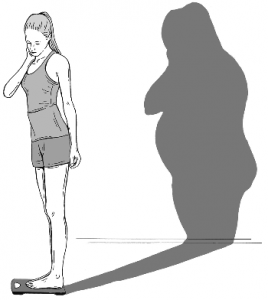Eating Disorders
The Olive Leaf fosters relationships with licensed psychologists for emotional counseling and registered dieticians to help formulate dietary guidelines. Therefore, these specialists are needed in order to fully help those suffering from eating disorders. Furthermore, we do not treat the psychological aspect of the disorder. We do provide micronutrient testing to see if the disorder is adversely affecting the physical health of the person suffering from the condition. Also, The Olive Leaf receives referrals from clinical psychologists, as well as psychiatrists to help support the patient. Great results are obtained when the physical teams up with the emotional to help a patient fully understand how certain lifestyle choices may be affecting their body.
As a practitioner in Natural Health and a mom of two girls, I fully understand the impact that the media has on our children. Especially, from a young age to obtain a reality that which is only “virtually” impossible to achieve. Hence, one of my greatest joys in practice is seeing someone battling an eating disorder to emerge triumphantly! In Addition, setting SMART goals which help move the patient out of this season, into a better place both mentally and physically. Especially relevant, anyone seeking care from the Olive Leaf must realize that this condition has to have both the physiological as well as the nutritional component in place. Most of all, potential patients should be under the care of a licensed psychologist or registered dietician and if not, will receive a referral to one or both in order to obtain optimal help.
Eating Disorders Statistics from the Emily Program:
In conclusion, eating disorders such as anorexia, bulimia, and binge eating are not a choice. Consequently, they are serious mental illnesses which can have devastating impacts. As a result, these are some common statistics about eating disorders around, which we base much of our community education and outreach.
- Eating Disorders affect up to 30 million Americans and 70 million
- 1 in 5 women struggles with an eating disorder or disordered eating.
- Middle-aged women are the fastest growing segment of the population being diagnosed with eating disorders
- Bullying about body size and appearance is the most common form of bullying in schools.
- The most common behavior that precedes and predicts an eating disorder is dieting.
- 42% of 1st-3rd-grade girls want to be thinner.
- Men constitute 40% of those exhibiting Binge Eating Disorder.
- Girls who diet frequently are 12 times as likely to binge as girls who don’t diet.
- 25% of American men and 45% of American women are on a diet on any given day.
- Americans spend over $40 billion on dieting and diet-related products each year.
- Four out of ten individuals have either personally experienced an eating disorder or know someone who has.
- 81% of ten-year-olds are afraid of being fat.
- 52% of Minnesota high school females fast or skip meals to control weight.


